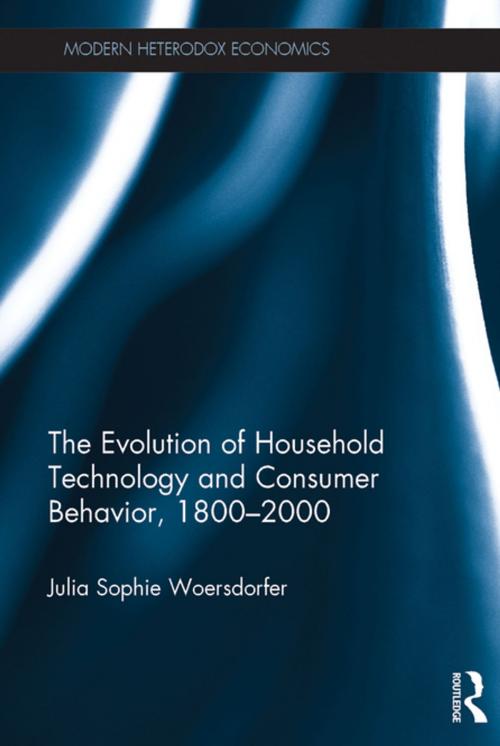The Evolution of Household Technology and Consumer Behavior, 1800-2000
Business & Finance, Marketing & Sales, Consumer Behaviour, Economics| Author: | Julia Sophie Woersdorfer | ISBN: | 9781351789080 |
| Publisher: | Taylor and Francis | Publication: | March 27, 2017 |
| Imprint: | Routledge | Language: | English |
| Author: | Julia Sophie Woersdorfer |
| ISBN: | 9781351789080 |
| Publisher: | Taylor and Francis |
| Publication: | March 27, 2017 |
| Imprint: | Routledge |
| Language: | English |
The increasing division and specialization of labor between the market and the nonmarket sector is a central stylized fact of long-run economic development. Over time, a large share of activities which had formerly been carried out by the private household itself has become replaced by market alternatives, raising at the same time the demand for consumer goods.
The neoclassical economic framework of household production theory relates the increasing demand for household technology to rising wages and opportunity costs of time: the higher the wage rate, the more costly it is to spend time in unpaid housework activities. Consumer products are thus purchased to make household production processes more efficient and to substitute capital goods for the household’s time (time substitution hypothesis). Although this hypothesis sounds plausible at first sight, it cannot capture the essential phenomena underlying the complex process of the mechanization of the home over the past 200 years. Its major weakness lies in the treatment of consumer preferences, whose explanatory potential is explicitly factored out.
Using the washing of clothes as a microcosm of household economics, this book examines long-term changes in cleanliness consumption patterns from the perspective of an evolutionary economic, psychologically informed consumer theory. Woersdorfer shows how the historical evolution of cleanliness consumption over the past 200 years is the result of the interplay of supply and demand side factors, namely, technical change in washing technology on one side and motivational driving forces and consumer learning capabilities on the other. Hence, not changing relative prices but innate consumer needs and consumer learning processes, leading to a growing understanding of how to satisfy those needs, are the essential driving forces behind the rising technological endowment of the home and the corresponding demand for household appliances.
The Evolution of Household Technology and Consumer Behavior, 1800–2000 will be of interest to researchers in the field of evolutionary economics, historyof technology, economic history, innovation economics and sociology.
The increasing division and specialization of labor between the market and the nonmarket sector is a central stylized fact of long-run economic development. Over time, a large share of activities which had formerly been carried out by the private household itself has become replaced by market alternatives, raising at the same time the demand for consumer goods.
The neoclassical economic framework of household production theory relates the increasing demand for household technology to rising wages and opportunity costs of time: the higher the wage rate, the more costly it is to spend time in unpaid housework activities. Consumer products are thus purchased to make household production processes more efficient and to substitute capital goods for the household’s time (time substitution hypothesis). Although this hypothesis sounds plausible at first sight, it cannot capture the essential phenomena underlying the complex process of the mechanization of the home over the past 200 years. Its major weakness lies in the treatment of consumer preferences, whose explanatory potential is explicitly factored out.
Using the washing of clothes as a microcosm of household economics, this book examines long-term changes in cleanliness consumption patterns from the perspective of an evolutionary economic, psychologically informed consumer theory. Woersdorfer shows how the historical evolution of cleanliness consumption over the past 200 years is the result of the interplay of supply and demand side factors, namely, technical change in washing technology on one side and motivational driving forces and consumer learning capabilities on the other. Hence, not changing relative prices but innate consumer needs and consumer learning processes, leading to a growing understanding of how to satisfy those needs, are the essential driving forces behind the rising technological endowment of the home and the corresponding demand for household appliances.
The Evolution of Household Technology and Consumer Behavior, 1800–2000 will be of interest to researchers in the field of evolutionary economics, historyof technology, economic history, innovation economics and sociology.















